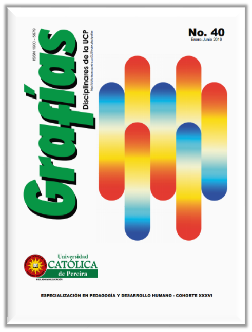Characterization of the affective relationship between teachers and students with diverse capacities in the Sagrado Corazón de Jesús Educational Institution the Bethlemitas Sisters of the municipality of Filandia, Quindío, during the year 2019
DOI:
https://doi.org/10.31908/grafias.v0i40.2640Keywords:
Relationship, affectivity, diverse abilities, characterization, teachers, students, school, teaching and learningAbstract
This research article is the product of the analysis carried out to characterize the affectivity between teachers and students with diverse abilities of basic primary in the Sacred Heart of Jesus School, in Filandia, Quindío. With the above, to work investigative, a mixed methodology was applied where the instruments used were surveys, interviews, class observation for teachers and students of the school; of Similarly, the analysis of results were applied to statistical graphs to measure the responses of teachers and students in the institution about the level of affectivity.
References
Congreso de la República de Colombia. (1994). Ley General de Educación. https://www.mineducacion.gov.co/1621/articles-85906_archivo_pdf.pdf
Duarte, E. (2003). Creatividad como un recurso psicológico para niños con necesidades educativas especiales. Sapiens. Revista Universitaria de Investigación, 4, 1–17. http://www.redalyc.org/articulo.oa?id=41040201
Echeita Sarrionandia, G. (2013). Inclusión y exclusión educativa. De nuevo “voz y quebranto” reice. Revista Iberoamericana sobre Calidad, Eficacia y Cambio en Educación, 11(2), 99-118.
García, I., Romero Contreras, S., Escalante Aguilar, L., Flores Barrera., J. (2018). ALGUNAS PROPIEDADES PSICOMÉTRICAS DE LAS GUÍAS PARA EVALUAR PRÁCTICAS INCLUSIVAS EN EL AULA. REOP. Vol. 29, nº2, 2º Cuatrimestre, 2018, pp. 8 - 28 [ISSN electrónico: 1989-7448]. México. Universidad de San Luis Potosi. Recuperado de: file:///C:/Users/ADMIN/Downloads/23150-48751-1-SM.pdf
Galindo Cáceres, L. J. (Coord.) (1998). Técnicas de investigación en sociedad, cultura y comunicación. Logman: México. Pearson Educación. Homogeneidad y Heterogeneidad del fenómeno (pp. 33-73).
Giraldo A. y Gil J. (2017) Manifestaciones de las competencias ciudadanas emocionales y la convivencia en dos grupos de básica primaria de la Institución Educativa Ciudadela Cuyabra de Armenia. Competencias ciudadanas integradoras. (pp. 34-35) Recuperado el 16 de enero de 2020: https://core.ac.uk/download/pdf/153513251.pdf
Godoy, M. y Campoverde, B. (2016). Análisis comparativo sobre la afectividad como motivadora del proceso enseñanzaaprendizaje-casos: Argentina, Colombia
y Ecuador. (2), 217–231. Revista: sophia vol.12. Recuperado el octubre 28 de 2019: https://doi.org/10.18634/sophiaj.12v.2i.227
Pole, K. (2009). Diseño de metodologías mixtas. Una revisión de las estrategias para combinar metodologías cuantitativas y cualitativas. Perspectivas históricas (pp. 38-41) Recuperado de: https://rei.iteso.mx/bitstream/handle/11117/252/katrhryn_pole.pdf
Romero, S., García, I., Rubio, S., Martinez, A. y Flores, V. (2015). Influencia del tipo de escuela (especial o regular) sobre el aprovechamiento académico del alumnado con necesidades educativas especiales. https://doi.org/10.11144/Ja
Villa, C. L. K., López, C. M. M., & Collazos, L. M. P. (2011). La inclusión educativa: un escenario de expresiones afectivas como mediadoras del aprendizaje. Plumilla educativa, 8(2), 176-190
Duarte, E. (2003). Creatividad como un recurso psicológico para niños con necesidades educativas especiales. Sapiens. Revista Universitaria de Investigación, 4, 1–17. http://www.redalyc.org/articulo.oa?id=41040201
Echeita Sarrionandia, G. (2013). Inclusión y exclusión educativa. De nuevo “voz y quebranto” reice. Revista Iberoamericana sobre Calidad, Eficacia y Cambio en Educación, 11(2), 99-118.
García, I., Romero Contreras, S., Escalante Aguilar, L., Flores Barrera., J. (2018). ALGUNAS PROPIEDADES PSICOMÉTRICAS DE LAS GUÍAS PARA EVALUAR PRÁCTICAS INCLUSIVAS EN EL AULA. REOP. Vol. 29, nº2, 2º Cuatrimestre, 2018, pp. 8 - 28 [ISSN electrónico: 1989-7448]. México. Universidad de San Luis Potosi. Recuperado de: file:///C:/Users/ADMIN/Downloads/23150-48751-1-SM.pdf
Galindo Cáceres, L. J. (Coord.) (1998). Técnicas de investigación en sociedad, cultura y comunicación. Logman: México. Pearson Educación. Homogeneidad y Heterogeneidad del fenómeno (pp. 33-73).
Giraldo A. y Gil J. (2017) Manifestaciones de las competencias ciudadanas emocionales y la convivencia en dos grupos de básica primaria de la Institución Educativa Ciudadela Cuyabra de Armenia. Competencias ciudadanas integradoras. (pp. 34-35) Recuperado el 16 de enero de 2020: https://core.ac.uk/download/pdf/153513251.pdf
Godoy, M. y Campoverde, B. (2016). Análisis comparativo sobre la afectividad como motivadora del proceso enseñanzaaprendizaje-casos: Argentina, Colombia
y Ecuador. (2), 217–231. Revista: sophia vol.12. Recuperado el octubre 28 de 2019: https://doi.org/10.18634/sophiaj.12v.2i.227
Pole, K. (2009). Diseño de metodologías mixtas. Una revisión de las estrategias para combinar metodologías cuantitativas y cualitativas. Perspectivas históricas (pp. 38-41) Recuperado de: https://rei.iteso.mx/bitstream/handle/11117/252/katrhryn_pole.pdf
Romero, S., García, I., Rubio, S., Martinez, A. y Flores, V. (2015). Influencia del tipo de escuela (especial o regular) sobre el aprovechamiento académico del alumnado con necesidades educativas especiales. https://doi.org/10.11144/Ja
Villa, C. L. K., López, C. M. M., & Collazos, L. M. P. (2011). La inclusión educativa: un escenario de expresiones afectivas como mediadoras del aprendizaje. Plumilla educativa, 8(2), 176-190


